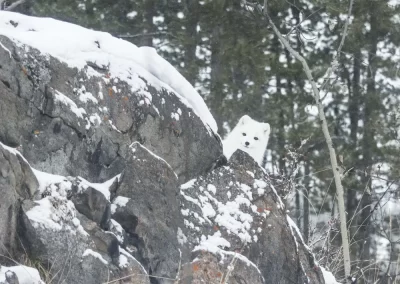
Arctic Fox Passes Away
6 minute read
It is with a heavy heart that announce the passing of the Yukon Wildlife Preserve’s lone Arctic Fox. She was 14 years old. After her most recent check-up our Animal Care Team made the difficult decision to euthanize her on July 23rd. Her condition had deteriorated in recent months. She had developed a significant ovarian tumor and multiple organ failure.
She was born at the Assiniboine Park Zoo in 2009 and came to the Preserve in 2010 with her 2 siblings. The two siblings passed away in 2020 and 2022. Her and her siblings were curious and energetic. They had a contagious energy that delighted staff and visitors alike.
On the coldest winter days they were often seen curled up on top of their rock, fluffy tails wrapped around their noses, where they could watch visitors go by. On warmer sunny days they preferred the cooler deep grass and shade of the willows off to the side.

Photo of the female fox taken in winter curled up on her favourite spot.
Photo credit: Jeff Wendorff
They provided an opportunity for Yukoners and tourists to learn about Yukon’s Arctic wildlife. Their small stature, especially compared to the more common Red Foxes, surprised many visitors. Their seasonal fur coat change also provided an opportunity to engage visitors in conversation and learning about Arctic adaptations, ecosystems and climate change.

“Our Arctic Foxes were remarkable animals – cute and fluffy with a contagious curious energy,” said Executive Director Jake Paleczny. “Connecting to a real life animal is a powerful way to connect people to important places, landscapes and ecosystems that might not be in our backyard. We’re really going to miss them.”
The Preserve has been searching for suitable successors for several years now; however, it has been surprisingly difficult. Arctic Foxes were once quite common in Canadian zoological facilities. However; most of the Arctic Foxes in North American zoological facilities are currently non-phenotypical. That is to say, they are hybridized from fur farms and lack characteristics like the seasonal fur change. With the Preserve’s education focused mission to connect visitors to the natural world, it’s critical that Arctic Foxes at the Preserve are phenotypically sound.

The Preserve is continuing its search for Arctic Foxes. In the meantime, our team is looking at using the Arctic Fox’s 16,000ft2 habitat for a temporary expansion of Lynx habitat. That will provide an additional space available to the Lynx and enlarge their current 24,000ft2 exhibit to approximately 40,000ft2. The Preserve is known for its large, natural habitats. The existing Lynx habitat was already amongst the largest in the world.
• • •
The Yukon Wildlife Preserve is a zoological institution and a non-profit charity dedicated to connecting our visitors with the natural world. As ambassadors of the Yukon Wildlife Preserve’s animals, lands, and operations, the operating society proudly maintains populations of 10 species of Yukon wildlife in large natural habitats. The society also conducts educational programming and funds a wildlife rehabilitation program for Yukon’s injured and orphaned wildlife. The facilities and the level of care provided to the Preserve’s animals successfully meets the stringent criteria of Canada’s Accredited Zoos and Aquariums, to which the Yukon Wildlife Preserve is a long-time member.
Photo credits: J.Paleczny & L.Caskenette unless otherwise noted.

Jake Paleczny
Executive Director
Jake Paleczny is passionate about interpretation and education. He gained his interpretative expertise from a decade of work in Ontario’s provincial parks in addition to a Masters in Museum Studies from the University of Toronto. His interests also extend into the artistic realm, with a Bachelor of Music from the University of Western Ontario and extensive experience in galleries and museums.





Thank you to Jake and the team for a WONDERFUL and very informative day today. What a privilege we have in Canada to be able to see first hand these animals in their natural habitat.
I grew up in Regina SK and their now Royal Saskatchewan Museum was always a fascinating place to visit. I never tired of their displays. Fast forward many decades, this day brought back many great memories and have given me many more.
Thank you so much for your support and shared love of the natural world.